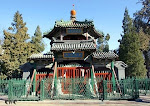Michael Dillon's sections are focused in particular on the Hui community within China - their history, particularly significant events dating back to early dynasty of which the results are still being played out even today, culture and overall development of the identity that the members of this society carry on so dearly.
Of particular interest, to me, was the idea of how the Hui are managing themselves and their culture within the greater Han Chinese society that they co-exist with - whether it's in a peaceful manner or in an ethically tense manner. Regardless of the the manner of these two communities' co-existence with each other, I think it's the idea of assimilation that comes off as important here.
No matter how much resistance that is given, I would say that it is inevitable for religions, cultures, and ethnic identities to find itself assimilating, to some degree, with the surrounding, usually majority-based, cultural society around it. For the Hui Chinese, that would inevitably be the Han Chinese - generally regarded as the 'typical' example of what Chinese culture is seen as.
I wouldn't say that I see this assimilation or acculturation on a one-sided basis. That is, it isn't just the Hui culture that is being assimilated with the Han Chinese culture - the reverse is also applicable and true, to whatever degree it may be. Culture and religions are always developing because of this; their encounters and exposures to something new inevitably leads to the birth of a somewhat 'new' form of the former. In other words, Hui Chinese culture finds itself taking in aspects of Han Chinese culture and incorporating it into whatever was already in existence. Generally the change is most likely not that great, but still - there is a new 'form' that is birthed. This combination of different cultures and identities, at some points aiding in the formation of new ones, is an interesting phenomeno.
Wednesday, September 30, 2009
Subscribe to:
Post Comments (Atom)





I completely agree that acculturation happens for both sides. Yes, to different exents, but it definitely happens in any society. I guess you could say it's the way of the world.
ReplyDelete